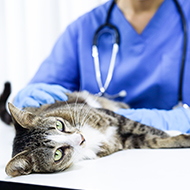World-first study into blood pressure and renal function in cats

“This study has shown us, as proof of concept, that large scale genomic studies will be important for understanding the pathogenesis of such complex disease conditions" - Rosanne Jepson, RVC.
A team from the Royal Veterinary College (RVC) has carried out a world-first genome study evaluating renal function and blood pressure traits in domestic cats.
The study, published in the journal Scientific Reports, could reveal insights into new and important information about the development of chronic kidney disease (CKD) and hypertension (HTN).
In the study, researchers examined the archives of some 1,022 domestic cats seen at both the RVC’s Beaumont Sainsbury Animal Hospital and Bow PDSA Pet Hospital since 1992. The team were specificially looking for genetic associations with CKD and HTN using a genome-wide association study (GWAS) approach.
The GWAS approach used a special feline array to characterise more than 63,000 genetic differences across the feline genome. Researchers looked at the impact of different genes on these complex disease traits, which might lead to new treatment options because the pathways and proteins regulated by these genes can reveal novel disease processes.
The study also highlighted the potential of using this approach to investigate complex disease conditions in the future.
Historically, the study method has been used for rarer and breed-specific conditions where single genetic mutations occur. However, the findings show it could be used to generate novel information about common and complex diseases that are likely to be the consequence of genetic, lifestyle and environmental risks.
Rosanne Jepson, principal author of the paper and associate professor in small animal internal medicine at the RVC, said: “This was an exciting opportunity to explore potential genetic influences on the development of chronic kidney disease and systemic hypertension in cats, collaborating with key opinion leaders who work and have published extensively in this field in human medicine.
“These conditions are complex - meaning that there are many factors relating to genetics, lifestyle and environment that cumulatively determine whether an individual may develop either CKD or hypertension in their lifetime.
“This study has shown us, as proof of concept, that large scale genomic studies will be important for understanding the pathogenesis of such complex disease conditions and may help to identify novel pathways as targets for diagnosis and management in the future.”



 The RCVS has announced a new version of its 1CPD mobile app, with enhanced features for veterinary surgeons and veterinary nurses to record their continuing professional development.
The RCVS has announced a new version of its 1CPD mobile app, with enhanced features for veterinary surgeons and veterinary nurses to record their continuing professional development.